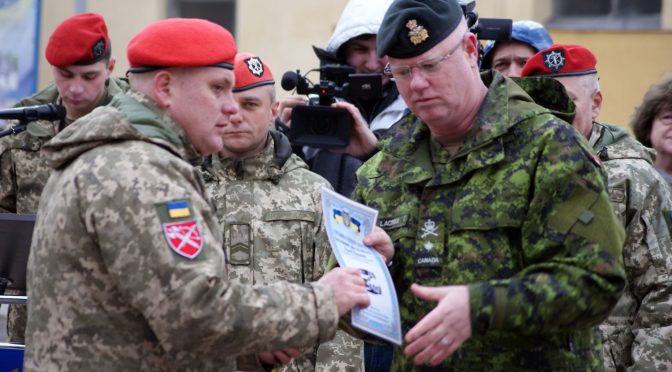Over the past year Ottawa has given Ukraine over $2 billion in weapons. The size of the arms donation is unprecedented in Canadian history.
According to a February 17 Le Devoir calculation, Canada has delivered $2.26 billion in weapons to Ukraine. The paper costed 17 different announcements, which include 4 heavy tanks, 4,200 single-use rocket launchers, an anti-aircraft missile system, 4 howitzers with 27,000 shells, 76 drone cameras, 247 armored vehicles and more. On Friday the Liberals announced they were sending four more heavy tanks, an armored recovery vehicle and more than 5,000 rounds of ammunition.
Since World War II, this quantity of arms donations is unprecedented. The only example that may be comparable is the arms Canada transferred through NATO’s Mutual Aid Program in the decade after the alliance was created. Between 1950 and 1958 Ottawa donated $1.53 billion ($9 billion today) in ammunition, fighter jets, military training, etc. to European NATO countries.
Through this program Canada armed France, Belgium and Britain as they violently suppressed independence struggles in Algeria, Congo, Kenya and elsewhere.
In reference to France’s bid to suppress the Vietnamese independence movements, external affairs minister Lester Pearson told Parliament in 1953 that “the assistance we have given to France as a member of the NATO association may have helped her recently in the discharge of some of her obligations in Indo-China.” With 400,000 French troops in Algeria in 1956 Canada transferred hundreds of thousands of bullets to that country.
During the 1950s and 60s Ottawa armed the colonial powers rather than the independence movements. In subsequent years it sold significant amounts of weapons to the US, not the Vietnamese resistance. Likewise, it armed the South African apartheid regime in the 1970s, not Nelson Mandela’s African National Congress. During the 1980s Canadian firms sold Indonesia weapons, not the East Timorese independence movement.
Today, Canada is selling weapons to Saudi Arabia, not the Houthis fighting a vicious foreign invasion of their country. Similarly, Canadian firms sell arms to Israel, not the Palestinians resisting an illegal occupation.
Just months before Russia’s invasion last year, Rwanda instigated a new wave of violence in its three-decade long destruction of eastern Congo. Sending a fraction of the weapons Canada has given Ukraine to Congo would likely end Rwanda’s violence. Or Ottawa could halt Kigali’s violence by severing aid to Rwanda and launching a major diplomatic campaign against it.
Similarly, if Canada and Europe announced a boycott of all contacts and trade with Israel until that country ended its system of apartheid and the illegal occupation of the West Bank and Gaza, change would come quickly.
If Ottawa were truly concerned about sovereignty and international law, wouldn’t it send weapons where they would be most effective in ending foreign aggression and the breaking of international law?
The truth is, rather than defend a country invaded by its neighbor, Canada’s massive arms shipments to Ukraine is designed to fuel and escalate an eight-year-old proxy war that Russia massively expanded 12 months ago. Last week foreign affairs minister Melanie Joly declared, “right now, it’s not time to talk about peace, it is time to arm them.”
Joly went on to say, “I never thought as a progressive politician that I would be saying that.” The foreign minister’s claim to be fighting for peace is nonsense. Amidst Russia massing 100,000 troops on its border with Ukraine 13 months ago, Joly traveled to Ukraine to promote NATO expansion, knowing it would increase the likelihood of Russia invading.
Additionally, Joly ignored the Minsk II peace accord (the only time she mentioned it was the day after Vladimir Putin recognized the People’s Republic of Luhansk and Donetsk when she could blame Moscow for breaking the accord).
Beginning in 2015 Canada’s Operation Unifier military training mission undermined the Minsk peace accord and helped make Ukraine a de facto member of NATO. A year earlier Ottawa helped overthrow elected president Victor Yanukovich who opposed Ukraine joining NATO.
Canada’s open conflict with Russia over the past decade is part of a historic geopolitical struggle to reduce that country’s size and influence. A small number of Canadians fought with the British during the 1850s Crimean war and 6,000 Canadians along with British, American, French and other allied troops invaded Russia in 1918. Afterwards Ottawa refused to recognize the Bolshevik government for more than a decade and promoted Eastern European nationalism during the Cold War.
Since the breakup of the Soviet Union Ottawa has devoted significant resources to promoting anti-Russian forces in Ukraine. It immediately began funding anti-Russian Ukrainian civil society groups, which was on display with Canada’s significant role in the 2004 Orange Revolution.
Washington and Ottawa look set to continue fueling the fighting in Ukraine as part of the old geopolitical game. For supporters of the US empire billions of dollars in weapons is a price worth paying to weaken Russia. Hundreds of thousands of lives are not factored into the cost or can be ignored because they are Russians and Ukrainians.
Fortunately, cracks are appearing in the Canadian consensus when it comes to the policy of “fighting to the last Ukrainian”. On CBC The House last week Green party co-leader Jonathan Pedneault criticized “supplying weapons in active conflict areas” while a recent poll suggests the public is becoming increasingly weary of sending ever more arms. Canadians increasingly want peace talks.
Over the weekend, protests critical of Canadian policy were held in a half dozen cities. On Saturday in Montréal 150 rallied in the bitter cold under the banner “No to Russia’s invasion of Ukraine. No to NATO’s encirclement of Russia”. They joined over 10,000 in Berlin and thousands in London over the weekend as well as thousands more in Washington DC and Munich the previous weekend.
More and more Canadians of conscience have decided it’s time to stop the madness. Time to end arms shipments now.


